- Home
- Projects-Clinics
- Staff
- Summer Internships
- Past Projects
- RU Sustainable Facilities Center
Sustainable Facilities Center
Henry M. Rowan College of Engineering
Rowan University
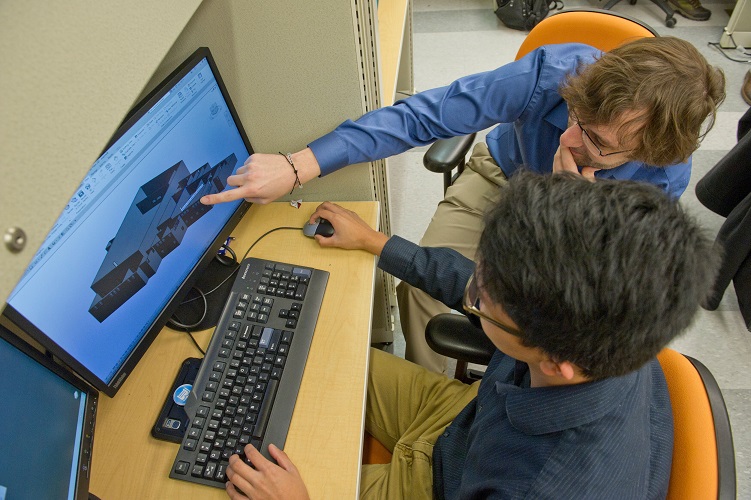 The Sustainable Facilities Center (SFC) is part of the Henry M. Rowan College of Engineering at Rowan University (RU). The center helps public and private entities sustainably manage facilities by reducing the environmental, economic, and social impacts of buildings. The faculty associated with the SFC have worked on sustainable facilities projects since before 2004. These efforts resulted in the founding of the SFC in 2018.
The Sustainable Facilities Center (SFC) is part of the Henry M. Rowan College of Engineering at Rowan University (RU). The center helps public and private entities sustainably manage facilities by reducing the environmental, economic, and social impacts of buildings. The faculty associated with the SFC have worked on sustainable facilities projects since before 2004. These efforts resulted in the founding of the SFC in 2018.
Assistance offered by SFC includes:
- BUILDER SMS implementation;
- Building energy & water audits;
- 3D laser scans of building interiors & exteriors;
- Building information modeling using Autodesk Revit;
- Facility management using FacilityDude;
- Energy outreach and planning;
- Installation Status Reports;
- Solar and wind assessments.
Graduate and undergraduate students are crucial to the success of the SFC. Graduate students work on center-related theses and dissertations. Undergraduate students participate through summer internships and engineering clinic coursework.
Contact the center by emailing Jess W. Everett at everett@rowan.edu.
Check out this 2021 article on the center.
Check out these 2019 articles on the center: 1 | 2 | 3.
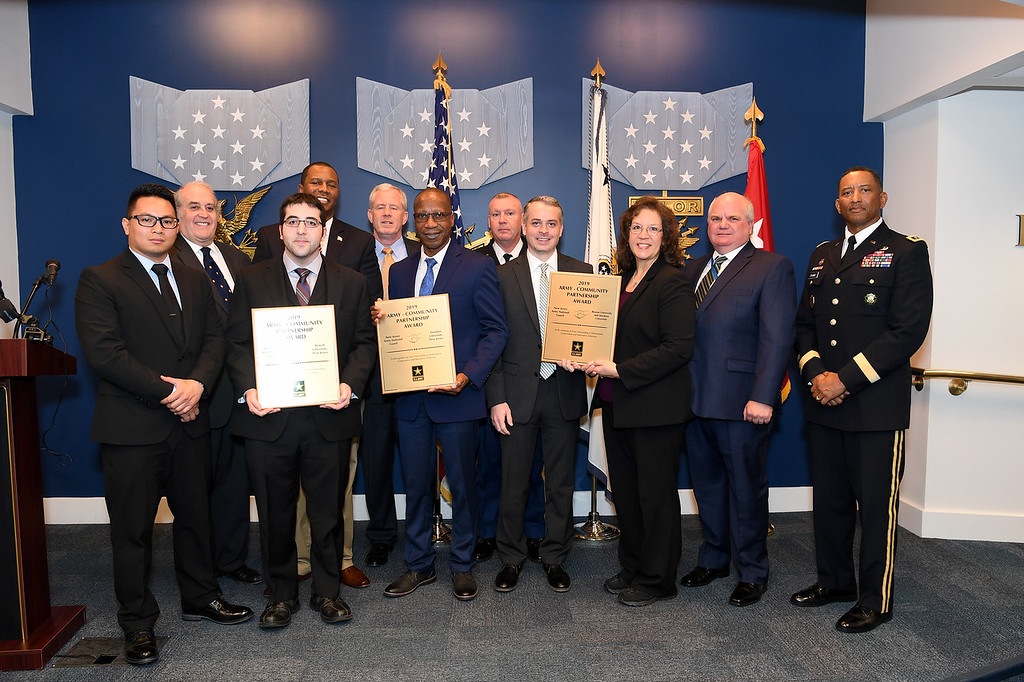
Current projects at the Sustainable Facilities Center (SFC) are funded by the New Jersey Department of Military and Veteran Affairs, the New Jersey Army National Guard and New Jersey American Water. CFS is open to working with other public or private organizations.
Students working on SFC Clinics have access to Rowan Hall Rm. 222 during normal working ours. Eat lunch, study, do HW!
Building Audits - NJDMAVA/NJARNG
SFC inventories energy & water consumption at 8 military facilities in NJ a year, e.g., Readiness Centers. Energy Audits involve modeling the energy consumption of a building and identifying opportunities to save on utility bills. Recommendations are often made that, when implemented, recover the cost of the audit in as little as one or two years. This project supports three clinics each semester, with CEE, ME, and ECE majors.
Facilities Management - NJDMAVA/NJARNG
SFC assists the NJ Department of Military and Veteran Affairs as it sustainably manages its facilities in New Jersey. This includes implementation and management of an online work order system, performing site visits to collect data and recommending preventative maintenance. Additional activities may include monitoring energy, water, and sewage flows, conducting life cycle assessments to identify the best options for equipment repair and replacement, verifying energy savings from implemented efficiency measures, or performing energy security inspections. This project supports one clinic each semester, open to all majors.
3D Building Models - NJDMAVA/NJARNG
SFC creates four 3D Building Information Models (BIM) of NJARNG facilities each year using 3D laser scanning technology and BIM software. The models will reduce the cost of future rennovations and repairs. This project supports one clinic each semester, open to CEE majors.
Ground Source Heat Pumps - NJDMAVA/NJARNG
NJDMAVA is tasked with electrification of its facilities. That means its buildings will eventually use only electricity, no oil or gas. Ground Source Heat Pumps are the most viable source of heat. Students are developing preliminary designs for a ground source heat pump systems at a NJDMAVA facility. This project supports one clinic each semester, open to all majors.
Sustainable Drinking Water - New Jersey American Water
New Jersey American Water provides drinking water to many NJ communities and is a large energy user. Students will help develop an approach to benchmarking energy efficiency at drinking water treatment facilities throughout NJ. They will use the benchmarking to identify candidate facilities for detailed energy audits. This project supports one clinic each semester, open to CEE and ChE majors.
BUILDER SMS - NJDMAVA/NJARNG
BUILDER SMS is a 'web-based software application developed by ERDC’s Construction Engineering Research Laboratory (CERL) to help civil engineers, technicians and managers decide when, where and how to best maintain building infrastructure.' SFC is helping NJARNG implement BUILDER in New Jersey. Twleve to fifteen Rowan students work as interns each summer (Engineering and Environmental Science majors). Some stay on to work during the semester.
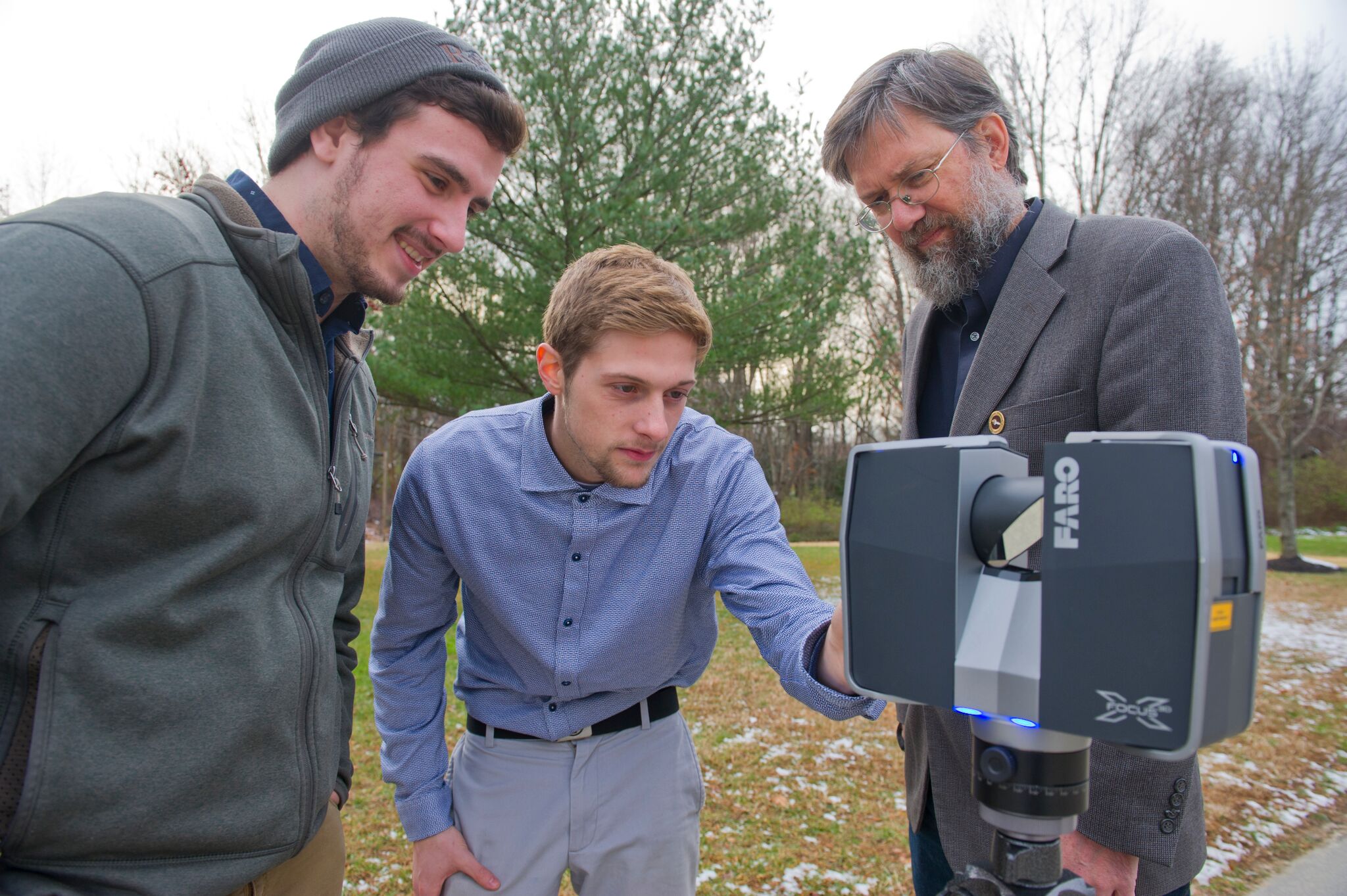
Installation Status Report (ISR) - NJDMAVA/NJARNG
SFC conducts 30 ISRs a year. The ISR is a 'web-based integrated executive information system ... developed by the Department of the Army in 1994 as a method to assess installation level conditions and performance against Army-wide standards.' Reports are compiled by SFC Staff.
Planning and Outreach - NJDMAVA/NJARNG
SFC staff assist NJARNG's education awareness program. They also assist with NJARNG's Installation Energy and Water Plan. Clinics assist when needed.
Jess W. Everett, Founding Director
Jess Everett (Ph.D. Duke University) is the founding director of the Sustainable Facilities Center and a professor of Civil and Environmental Engineering at Rowan University since 1998. He has conducted research in sustainable engineering, solid waste management, site remediation, and pedagogy using operations research, statistical methods, and laboratory and field-based experimentation. He has worked on 76 funded projects, published 62 refereed journal articles, and authored five electronic web-book for pathfinder.rowan.edu.
William Riddell
William Riddell (Ph.D. Cornell University) is an Associate Professor of Civil and Environmental Engineering. Prior to Rowan, Dr. Riddell worked at the NASA Langley Research Center, and the John A. Volpe National Transportation Systems Center. His research and teaching interests revolve around energy and infrastructure, with particular interest in how materials, design and operating environment interact to affect maintenance and inspection strategies as well as sustainability.
Kathy Mullins
Kathleen Mullins (B.S. Seton Hall University) joined the Rowan University SFC team in 2018 as the Sustainable Facilities advisor. She also assists with Builder SMS programs. She brings significant experience in both the private and public sectors (Insurance, Relocation, Project Management and Public Parking industries) in facilities management, maintenance, contract and lease negotiations, rent and facilities maintenance budgets, NJ public contract/bid requirements, and project management.
Jason Muermann
Jason Muermann (B.S./M.S. Rowan University) joined the Rowan University SFC team in 2022 as the Building Audit/BIM advisor. He leads projects in building energy/water auditing and building information modeling (BIM). Jason brings significant experience in both BUILDER system inventory and building energy/water auditing as an SFC student intern and graduate research fellow. He is interested in developing his knowledge in building heat transfer and energy modeling.
William Johnson
William Johnson (B.S. Neumann University) joined the Rowan University SFC team in 2021 as the Building Auditor/ISR Advisor. He works with student teams to conduct building energy/water audits, conducts facility inventories and completes Installation Status Reports for New Jersey, and assists with BUILDER SMS programs. His interests include nuclear energy technology, process safety, and facilities management.
Francis (Mac) Haas
Mac Haas (Ph.D. Princeton University) is an Associate Professor of Mechanical Engineering working in the thermal-fluid sciences. His research interests include alternative energy technologies, formation and transformation of air pollutants, advanced manufacturing techniques, process safety and applied data science.
Jie Li
Jie Li (Ph.D. Illinois Institute of Technology) is an Associate Professor of Electrical and Computer Engineering. Prior to Rowan, Dr. Li worked at Clarkson University, GE Energy Management, and IBM China Research Center. Her research lies in the planning, operation, and control of power systems, with particular interests in the modeling and optimization of large-scale electricity transmission and distribution systems with a deeper penetration of distributed energy resources, flexible demand-side assets, and Microgrids.
Adriana Trias-Blanco
Adriana Trias-Blanco (Ph.D. Rutgers University) is an Assistant Professor of Civil and Environmental Engineering. Dr. Trias’ research and teaching interest involves structural analysis, long-term performance, condition assessment, and remote sensing. Dr. Trias has conducted research in the implementation of remote sensors (LiDAR, infrared) on bridge condition assessment, construction QC, load rating, and structural characterization./p>
Robert Krchnavek
Robert Krchnavek (Ph.D. Columbia University) is an Emeritus Professor of Electrical and Computer Engineering. His research interests include alternative energy, smart grids, nanotechnology, MEMS, photonics, electromagnetics, and materials processing.
Rowan Undergraduate and Graduate Students
Currently, the CFS has three graduate students and anywhere from 16 to 24 undergraduate students. Approximately 16 student interns work at the center during the summer. Approximately 24 students work on projects each semester, through the Engineering Clinic program.

2023 Graduate Student Cohort
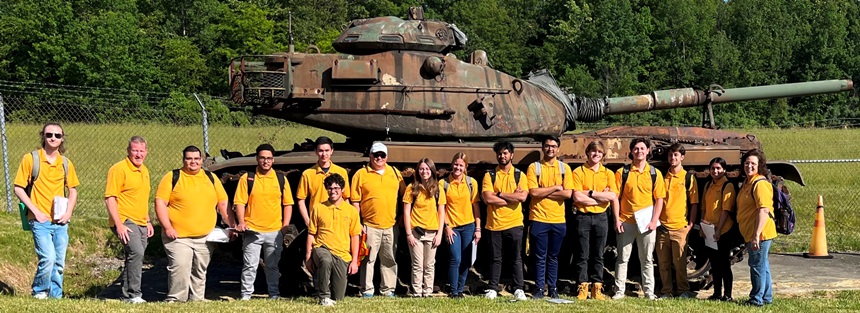
2023 Summer Interns with Staff
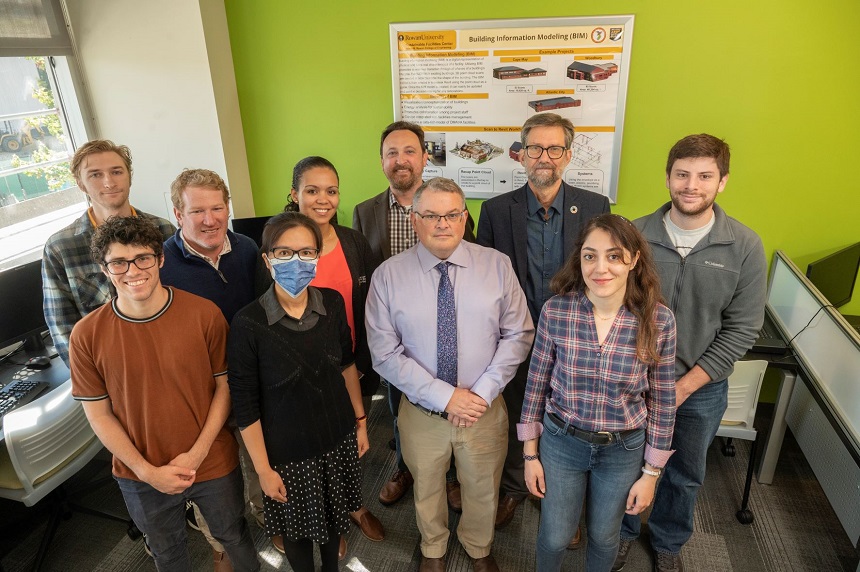
2022 Professors, Staff, and Students
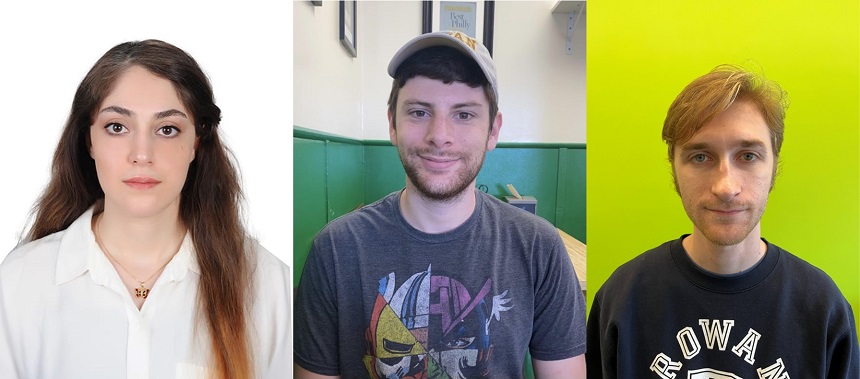
2022 Graduate Student Cohort
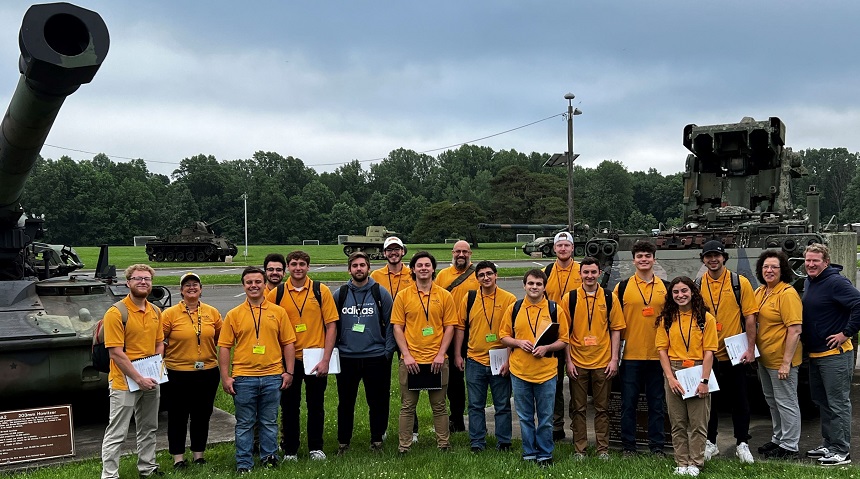
2022 Summer Interns with Staff
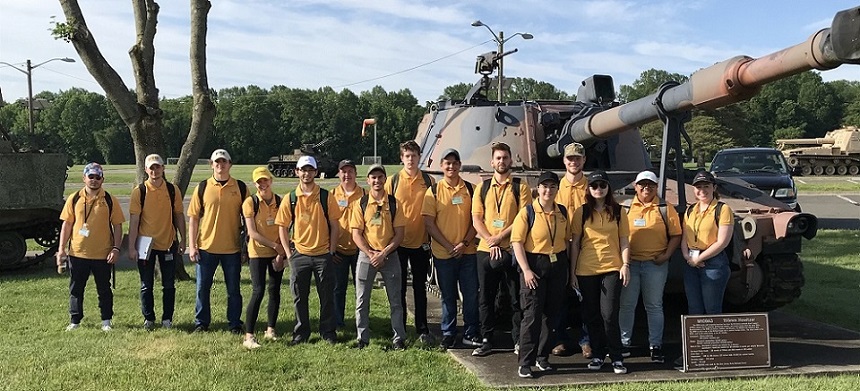
2021 Summer Interns
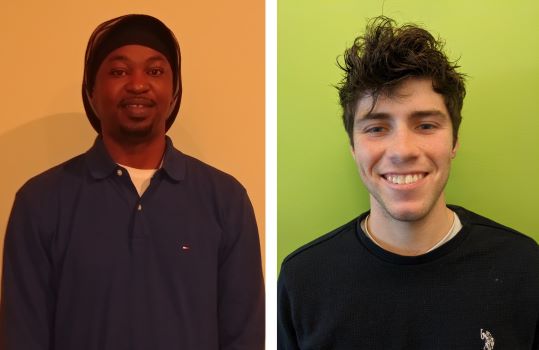
2020 Graduate Student Cohort
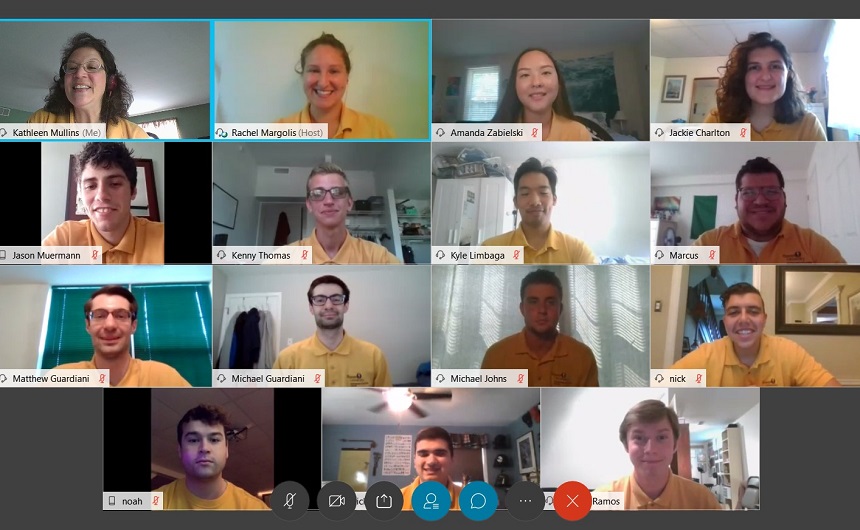
2020 Summer Interns with Staff

2018 Graduate Student Cohort
2019 Summer Interns
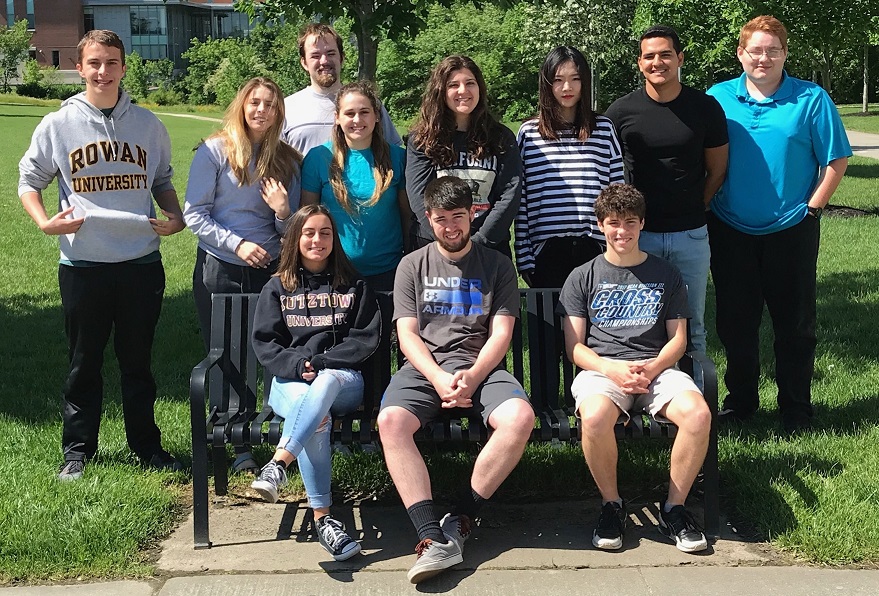
2018 Summer Interns
BUILDER Sustainable Management System (SMS) Internships
The Rowan University Sustainable Facilities Center hires 14 Rowan students for our Summer Internship program. Interns inventory NJ Army National Guard (NJARNG) buildings across NJ from May 19th to August 28rd (15 wks). Pay is $21 per hour for 25 hours per week. Students interested in a paid, real-world, technical experience should apply.
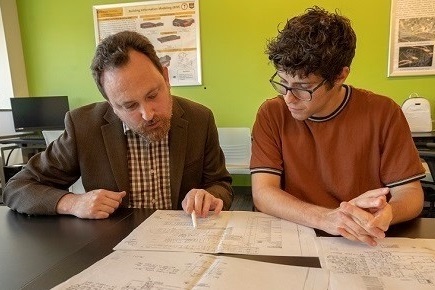
Key Tasks for BUILDER SMS
- Inventory NJ Army National Guard (NJARNG) buildings by conducting facility site surveys throughout New Jersey
- Enter site survey data into BUILDER SMS-BRED 3.5 software (training provided) at RU
- Provide quality control for data entry
- Generate reports using collected data for DoD and NJ Army National Guard
Internship Requirements:
- US citizen
- Rising Juniors or Seniors (and select Sophomores) in civil & environmental engineering, mechanical engineering, electrical & computer engineering; construction management; and environmental & sustainable science/studies
- Must work M-Th during normal business hours at either the Rowan Glassboro campus or in the field at NJ Army National Guard sites; This is not a remote work internship
- Must attend training May 19 through May 30, 2025
- Must participate in scheduled site surveys from June 2 through July 11, 2025 that may include some overnight stays
- Must provide own transportation to the NJARNG locations and hotels. Hotel rooms will be prepaid. All other travel costs will be reimbursed. Carpooling is encouraged, but not always possible
- Must provide a laptop capable of using BRED Application Version 3.5.3 software and a digital camera or phone capable of taking site photos
If you have vacations already planned, let us know in your email application.
Desired Qualifications/Qualities:
- Detail-oriented, organized, observant person with good note-taking skills
- Interest in field work and learning building system components
- Ability to work well in a team and independently
- Ability to provide a high-level of professionalism and confidentiality to a real client
- Previous work experience is preferred
- BIM (Building Information Modeling) or Audit experience is a plus, but not required
Email a brief cover letter and attach your resume as a pdf. Send to mullins@rowan.edu with the subject line "NJ National Guard Internship-XXX", where XXX are your initials. Your cover letter should describe your relevant experience, career/education goals, and availability for the summer. Applications are due by the third Friday in February, but sooner is better!
If you have any questions regarding this opportunity, email the NJDMAVA BUILDER Program Advisor, Ms. Kathy Mullins - (mullins@rowan.edu).
Some of the projects listed below pre-date the inception of the Sustainable Facilities Center in 2018. Similar projects can be completed within the center.
NJDMAVA Solar Hot Water
SFC assessed the feasibility of installing solar hot water systems for the supply of hot water at NJDMAVA facilities in NJ. We also evaluated different methods for estimating required capacity.
Bio-infiltration Basin & Rain Gardens
With funds from NJ Department of Environmental Protection and working with the Camden & Gloucester County Soil Conservation Districts, Rowan University built a bio-infiltration basin and three rain gardens demonstration sites on campus.
Solar Array Design
With funds from various entities, Rowan University has developed preliminary designs for arrays with capacity ranging from 50 to 500 kW.
Wind Assessments
With funds from various entities, Rowan University has assessed various locations in NJ regarding the suitability of siting wind turbines. Assessments were accomplished with anemometers on 30 m towers or with SODAR.
Wastewater Reuse
With funds from the US Environmental Protection Agency, Rowan University evaluated wastewater reuse in Gloucester County. Wastewater reuse involves using wastewater, i.e., the effluent from wastewater treatment plants, for a variety of purposes, such as irrigation, toilet flushing, cooling water, fire protection, and aquifer recharge. Wastewater reuse can increase the supply of usable water for humans. It can also be used to return streams to historical flow levels or prevent saltwater intrusion. The wastewater reuse project at Rowan University assessed potential wastewater reuse in the Northern portion of Gloucester County and evaluated a specific project involving the Pitman Golf Course, the new SJ Technology Park, and the proposed Rowan West Campus.
Zero Waste
Rowan University evaluated Zero Waste opportunities for the Boro of Pitman. The Zero Waste movements views discards as resources, not waste. Rowan University evaluated the town's recycling program and assessed opportunities to reduce and eliminate waste.